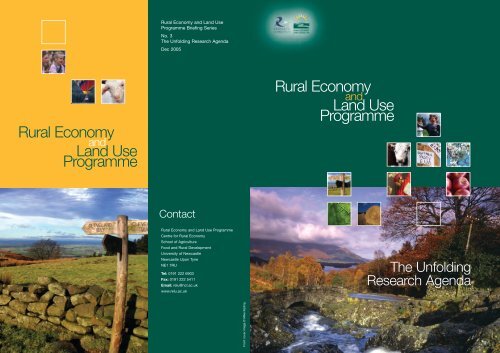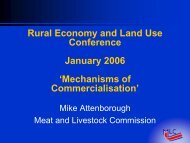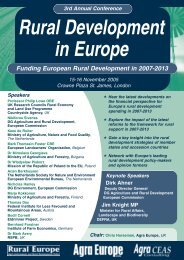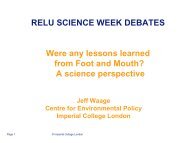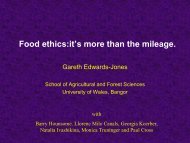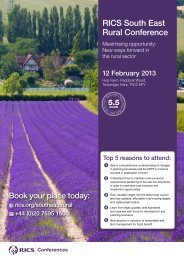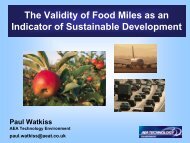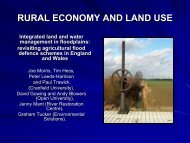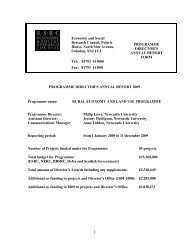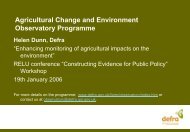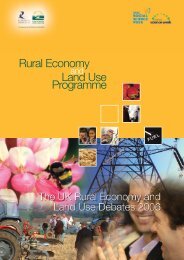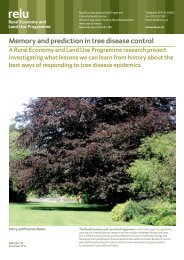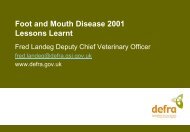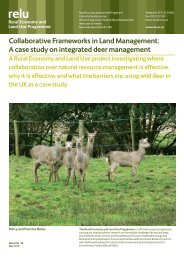Download pdf - Rural Economy and Land Use Programme
Download pdf - Rural Economy and Land Use Programme
Download pdf - Rural Economy and Land Use Programme
- No tags were found...
You also want an ePaper? Increase the reach of your titles
YUMPU automatically turns print PDFs into web optimized ePapers that Google loves.
<strong>Rural</strong> <strong>Economy</strong> <strong>and</strong> L<strong>and</strong> <strong>Use</strong><strong>Programme</strong> Briefing SeriesNo. 3The Unfolding Research AgendaDec 2005<strong>Rural</strong> <strong>Economy</strong><strong>and</strong>L<strong>and</strong> <strong>Use</strong><strong>Programme</strong><strong>Rural</strong> <strong>Economy</strong><strong>and</strong>L<strong>and</strong> <strong>Use</strong><strong>Programme</strong>Contact<strong>Rural</strong> <strong>Economy</strong> <strong>and</strong> L<strong>and</strong> <strong>Use</strong> <strong>Programme</strong>Centre for <strong>Rural</strong> <strong>Economy</strong>School of AgricultureFood <strong>and</strong> <strong>Rural</strong> DevelopmentUniversity of NewcastleNewcastle Upon TyneNE1 7RUTel: 0191 222 6903Fax: 0191 222 5411Email: relu@ncl.ac.ukwww.relu.ac.ukThe UnfoldingResearch AgendaFront cover image © Mike Kipling
© Mike Kipling“Issues of rural economy <strong>and</strong> l<strong>and</strong> use cannot be explored inisolation. Cooperation between the Research Councils <strong>and</strong> theirdistinct scientific communities is imperative if we are to improveour underst<strong>and</strong>ing of the health, welfare <strong>and</strong> sustainability of thecountryside.Through the <strong>Rural</strong> <strong>Economy</strong> <strong>and</strong> L<strong>and</strong> <strong>Use</strong> <strong>Programme</strong> we aredetermined to support researchers in superseding the segmenteddisciplinary approaches of the past. Thereby, the analysis of social<strong>and</strong> economic behaviour should be combined with research onthe ecology <strong>and</strong> biology of the natural environment.”Professor Sir Howard Newby,Chair of RELU Strategic Advisory CommitteeFigure 1: Number of research investigators by disciplineEcologyEconomicsHuman GeographyPhysical GeographyHydrologyEnvironmental Chemistry1IntroductionEnvironmental ModellingSociologySoil Science2Social AnthropologyEarth SciencesThe <strong>Rural</strong> <strong>Economy</strong> <strong>and</strong> L<strong>and</strong> <strong>Use</strong> <strong>Programme</strong> (RELU) is a radically interdisciplinary programme,Development Studiesfunded by the Economic <strong>and</strong> Social Research Council, the Biotechnology <strong>and</strong> BiologicalHuman PsychologySciences Research Council, Natural Environment Research Council, Scottish ExecutiveEnvironment <strong>and</strong> <strong>Rural</strong> Affairs Department <strong>and</strong> the Department for Environment, Food <strong>and</strong><strong>Rural</strong> Affairs. Every project funded combines social <strong>and</strong> natural science strengths. Projectsencompass researchers from over 30 disciplines (Figure 1) <strong>and</strong> more than 50 institutions(Figure 2). A fundamental aim of the programme is to build the capacity to do interdisciplinaryresearch in the long-term. Stakeholders are actively engaged at every stage of programme<strong>and</strong> project development.Social PolicyMicrobiologyManagement <strong>and</strong> Business StudiesEnvironmental InformaticsCrop ScienceBiochemistryPolitics/Political SciencePlanningHuman NutritionFood ScienceFish BiologyEntomologyThere have been two rounds of funding so far (Figure 3). Under “Sustainable Food Chains”,eight 3-4 year projects, totalling £6M, began late 2004. Under “People <strong>and</strong> the <strong>Rural</strong>Environment”, 26 capacity building <strong>and</strong> scoping studies have already been completed, <strong>and</strong>eleven 2-5 year projects, totalling a further £6M, start early 2006. The third call for fundingwill be judged during 2006 <strong>and</strong> will include research on: the management of animal <strong>and</strong> plantdisease; the analysis of the ‘urban footprint’ on rural infrastructure <strong>and</strong> ecosystem services;<strong>and</strong> the sustainability of rural settlement patterns <strong>and</strong> non-agricultural l<strong>and</strong> uses.Science Studies/Science PolicyPlant BiologyBioinformaticsAnimal SciencePopulation BiologyPhilosophyConsumer ScienceCivil/Water Engineering0 10 20 30 40 50 60
Figure 2: Institutions undertaking RELU researchUNIVERSITIES AND COLLEGESUniversity of AberdeenUniversity of BristolUniversity of CambridgeCranfield UniversityUniversity of DundeeUniversity of DurhamUniversity of East AngliaUniversity of ExeterUniversity of GlasgowUniversity of GloucestershireUniversity of HullKingston UniversityLancaster UniversityUniversity of LeedsUniversity of LeicesterUniversity College LondonImperial College LondonUniversity of ManchesterManchester MetropolitanUniversityMiddlesex UniversityUniversity of NewcastleUniversity of NottinghamUniversity of OxfordOpen UniversityUniversity of ReadingRoyal Agricultural CollegeUniversity of SheffieldUniversity of StirlingUniversity of SurreyUniversity of SussexUniversity of Wales, AberystwythUniversity of Wales, BangorUniversity of WarwickUniversity of York3INSTITUTESBritish Geological SurveyCentral Science LaboratoryCentre for Ecology <strong>and</strong> HydrologyCentre for Population BiologyHorticulture Research InternationalMacaulay InstituteInstitute of Organic ResearchInstitute of Food ResearchInstitute of Grassl<strong>and</strong> <strong>and</strong> Environmental ResearchRothamsted ResearchScottish Agricultural CollegeSilsoe Research InstituteOTHERBritish Trust for OrnithologyElm Farm Research CentreForest ResearchGame Conservancy TrustInternational Institute for Environment <strong>and</strong>DevelopmentVrije University AmsterdamSustainableFood Chains4Figure 3: RELU research themesResearch themes Type of research project Number of applications Projects Institutionsfor research funding funded fundedSustainable Research Projects, to 31 8 20Food Chains address the challenges facingagriculture <strong>and</strong> rural areas.People <strong>and</strong> the <strong>Rural</strong> Awards of £200,000 - £1 million 89 11 30Environment3-5 yearsThe integration of Capacity Building Awards 82 27 40l<strong>and</strong> <strong>and</strong> water use <strong>and</strong> Scoping Studies: (completed)scope research <strong>and</strong>The environmental facilitate development ofbasis of ruralinterdisciplinary researchdevelopmentcapacity.Development Activities:Economic <strong>and</strong> social facilitate developmentinteractions with the of the programme <strong>and</strong>rural environmentdemonstrate its value<strong>and</strong> potential.Awards of up to £50,0006-18 monthsAlthough advances in basic <strong>and</strong> strategic research have greatly exp<strong>and</strong>edthe potential to produce healthy food in an efficient <strong>and</strong> sustainablemanner, the uptake <strong>and</strong> application of this research are subject to social<strong>and</strong> economic dem<strong>and</strong>s <strong>and</strong> concerns. High-profile controversies overGM crops, farming-<strong>and</strong>-food crises, food safety scares, <strong>and</strong> resource<strong>and</strong> habitat depletion have all affected public confidence in thetechnologies underpinning the food system <strong>and</strong> intensified awareness ofthe environmental <strong>and</strong> social costs associated with where food comesfrom <strong>and</strong> how it is produced. The public concerns <strong>and</strong> consumeranxieties are in turn influencing the markets for food products <strong>and</strong> theclimate in which new technological developments are now promoted.In response, RELU research projects are adopting an integrated foodchain approach to explore several research themes including risk, diet<strong>and</strong> health, <strong>and</strong> sustainable production systems.
© Countryside Agency, David WoodfallRiskFrom farm to fork, risk is an inherent feature of the food chain. Risk issues range fromcontamination of water courses by farm run-off to consumers’ concerns over food safety.© Countryside Agency, P. Greenhalf5In recent crises in food <strong>and</strong> agriculture (e.g. BSE, E. coli, Foot <strong>and</strong> Mouth Disease) a narrowlytechnical perspective has too often been taken: the social, political <strong>and</strong> economic issues havebeen addressed too late in the process with the result that many people lose confidence in whatthe authorities are doing. Integration of Social <strong>and</strong> Natural Sciences to Develop ImprovedTools for Assessing <strong>and</strong> Managing Food Chain Risks Affecting the <strong>Rural</strong> <strong>Economy</strong> is amultidisciplinary project that is incorporating the thinking <strong>and</strong> values of stakeholders into thescientific modelling of such risks. The research is centred on three contrasting case studies: achemical contamination, a microbial contamination <strong>and</strong> a mock crisis scenario. The project isdeveloping ways to h<strong>and</strong>le uncertainties in the estimates of risk, taking account of the complexityof contemporary food chains <strong>and</strong> the possible reactions of consumers to information on foodsafety. Various groups, including producers, NGOs, regulators, risk managers <strong>and</strong> members ofthe public, are helping define the problem <strong>and</strong> discussing their underst<strong>and</strong>ing of risk. This willenable examination of the effectiveness of different forms of risk communication.Professor Richard Shepherd, University of Surrey r.shepherd@surrey.ac.ukDairy <strong>and</strong> beef farmers provide consumers with reliable sources of milk <strong>and</strong> meat, but the animalwaste generated poses environmental <strong>and</strong> social risks. The project Sustainable <strong>and</strong> HolisticFood Chains for Recycling Livestock Waste to L<strong>and</strong> is evaluating the changes needed inmanagement practices to limit the risk of pathogen transfers from grazing livestock, manures<strong>and</strong> other farm wastes to water courses. The effect of these changes on the economics <strong>and</strong>practicalities of farming are being investigated as well as the ‘knock-on’ effects for localcommunities <strong>and</strong> industries reliant on clean water supplies.Research to date has focussed on determining current farm management practices in the Tawcatchment in Devon. A core aspect of the work is the development of an index to assess the riskof pathogen transfers from farms to the environment. A consortium of experts is helping toassess the relative contribution of pathogen sources within the farming l<strong>and</strong>scape, the processesby which they are mobilised <strong>and</strong> the hydrological links connecting sources of pathogens to watercourses. The approach will be tested initially on ten farms that will be monitored to determinewhat risk of pathogen transfer they pose <strong>and</strong> to assess the effectiveness of different managementmeasures to reduce this risk.Diet <strong>and</strong> healthDiet has been linked to many of today’s most prominent public health problemssuch as type II diabetes, high blood pressure, heart disease <strong>and</strong> a range of cancers.Recommendations for healthy eating include the need to consume more fruit <strong>and</strong>vegetables (5 a day) <strong>and</strong> less saturated fat, especially saturated fats of livestockorigin (meat <strong>and</strong> dairy products).The research being undertaken at Reading, Implications of a Nutrition Driven Food Policyfor L<strong>and</strong> <strong>Use</strong> <strong>and</strong> the <strong>Rural</strong> Environment draws on a unique set of disciplines - economics,psychology, ecology, crop science, animal science <strong>and</strong> human diet <strong>and</strong> health - to assess thepotential for improvements in the nutritional quality of soft fruit, lettuce, <strong>and</strong> meat <strong>and</strong> milk,<strong>and</strong> the possible implications for both human health <strong>and</strong> the countryside.Soft fruit (strawberries, blueberries <strong>and</strong> raspberries) <strong>and</strong> lettuce are increasingly grown inpolythene tunnels. The research team are assessing the extent to which new ultra-violettransparent films enhance the levels of phytochemicals, known to have antioxidant (cancerprotecting) properties, in these crops. In addition, it is well known that milk <strong>and</strong> meat fromgrass-fed animals have a lower proportion of saturated fat <strong>and</strong> more of the beneficial n-3 fatsthan animals fed concentrates. The team are testing the hypothesis that more biologicallydiverse pastures for cattle will enhance these effects.However, there is also the question of whether consumer dem<strong>and</strong> exists for these products.The research is investigating consumers’ attitudes towards <strong>and</strong> their willingness to pay forsuch healthier foods, as well as their response to possible policy interventions to promotehealthy eating. The results will allow assessment of the potential benefits to consumers <strong>and</strong>public health <strong>and</strong> the impacts on the rural l<strong>and</strong>scape.Professor Bruce Traill, University of Reading w.b.traill@reading.ac.uk6Dr Dave Chadwick, IGER david.chadwick@bbsrc.ac.uk
© Mike KiplingCurrently substantial quantities of the vegetables we needare imported into the UK from around the world. Researchat the University of Bangor is providing a ComparativeAssessment of Environmental, Community <strong>and</strong>Nutritional Impacts of Consuming VegetablesProduced Locally <strong>and</strong> Overseas.Sustainable production systemsIn increasingly competitive markets, many food producers aim to specialise on qualityproducts. For their part, discerning consumers are anxious to know where their foodhas come from <strong>and</strong> whether it has been produced sustainably.The research team are comparing local <strong>and</strong> importedvegetables for their social costs, carbon budgets,7consumer acceptability, <strong>and</strong> health impacts. Fieldworkis being carried out in Kenya, Spain <strong>and</strong> the UK with avariety of vegetables, including beans, peas, brassicas,leafy/salad vegetables, potatoes <strong>and</strong> onions.The environmental costs of the greenhouse gasesproduced during growth <strong>and</strong> transport of the crops aswell as downstream costs of production, transport (foodmiles) <strong>and</strong> storage are being brought together in a LifeCycle Analysis (LCA) of vegetables from different sources.This will help determine which system has the lowestenvironmental impacts.Sociological field work is also examining the local foodcultures of different regions in the UK as well as consumerperceptions of health benefits of local <strong>and</strong> importedvegetables. A case study in Anglesey will help determinethe advantages <strong>and</strong> disadvantages, environmentally <strong>and</strong>socially, of increasing local production of vegetables.Early results suggest that issues of food sourcing arefar more complicated than simply 'food miles', <strong>and</strong> thatthe purchasing pattern of consumers can have majorimplications both for the climate <strong>and</strong> for local economicdevelopment <strong>and</strong> poverty alleviation in developingcountries.Professor Gareth Edwards-Jones,University of Wales, Bangor g.ejones@bangor.ac.ukEating Biodiversity: An Investigation of the Links between Quality Food Production <strong>and</strong>Biodiversity Protection is examining how environmental conservation of grassl<strong>and</strong>s can bemaintained <strong>and</strong> encouraged by linking it with the production <strong>and</strong> marketing of high quality food.The project is working closely with a number of initiatives managing semi-natural grassl<strong>and</strong>, aswell as with specialist producers <strong>and</strong> suppliers of animals raised on biodiverse vegetation.Research so far has focused upon the lamb supply chain, from sheep grazed on salt marsh, <strong>and</strong>heather <strong>and</strong> grass moorl<strong>and</strong>. Habitat type <strong>and</strong> meat quality <strong>and</strong> taste have been characterisedfor a number of sites. In addition, consumer focus groups are being consulted to determine theirwillingness to pay for products encouraging environmental quality. The work aims to clarify thepotential gains in farm income, food quality, <strong>and</strong> conservation from better marketing of the productsof grazing-l<strong>and</strong> biodiversity. The field work is being carried out in the UK, <strong>and</strong> research will continueon beef <strong>and</strong> cheese. Parallel developments in France are being followed <strong>and</strong> will help informrecommendations on appropriate br<strong>and</strong>ing, business infrastructure <strong>and</strong> farm advice.Professor Henry Buller, University of Exeter h.buller@exeter.ac.ukTilapia is a warm water fish with firm, white flesh <strong>and</strong> a mild taste very similar to a cod orhaddock. It is a favoured rural diversification option in many developing countries, but in recentyears it has found a market in Developed countries too. Tilapia is a hardy, fast growing fish <strong>and</strong>unlike other fish farmed in the UK, it can thrive on an herbivorous diet. It is, therefore, thoughtto be highly suitable for low cost aquaculture with the potential to be a more sustainable sourceof food with fewer environmental impacts than other farmed or wild caught fish. The projectWarmwater Fish Production as a Niche Production <strong>and</strong> Market Diversification Strategy forOrganic Arable Farmers aims to develop technical guidelines for a sustainable system for tilapiaculture as a potential diversification strategy for farmers in the UK. A comprehensive analysis ofthe practicality, sustainability <strong>and</strong> viability of the system is being gained through laboratory <strong>and</strong>on-site investigations <strong>and</strong> trials with two commercial partners.8
© Countryside Agency, Andy TrynerThe team is using consumer focus groups to examine the acceptance of tilapia withnumerous niche markets alongside the food service market. Transferring an alternativeproduction system from the Developing to the Developed World involves institutionalchange as well as innovations in farming systems <strong>and</strong> technologies. For example,the team is pioneering the formulation of appropriate guidelines for organic certificationof farmed fish with the Soil Association.Dr David Little, Stirling University d.c.little@stir.ac.ukconsiderations are left to the market. In addition, theproject is drawing attention to the need for refinementto the system of mutual recognition in the EU, wherebya product approved by a member state needs to beapproved in all states, with indications that carefulchanges are needed to help this operate moreeffectively.9There is a real need to develop alternatives to chemical pesticides for sustainablefarming, due to the increasing development of pesticide resistance <strong>and</strong> concernsabout safety <strong>and</strong> protecting the environment. These concerns have largely been aboutthe safety of pesticide residues in food <strong>and</strong> recently attention has been drawn topossible health issues arising from spray drift. One approach to reducing dependenceon chemical pesticides is the promotion of naturally occurring organisms as pestcontrol agents, but the rate of commercialisation of such bio-pesticides has beenlow. Two RELU projects are addressing the opportunities <strong>and</strong> obstacles fromcomplementary angles.The project Biological Alternatives to Chemical Pesticide Inputs in the Food Chain:An Assessment of Environmental <strong>and</strong> Regulatory Sustainability is examining the rulesgoverning the introduction of pest control agents in the UK, Europe <strong>and</strong> the USA to assesswhether changes in regulations might encourage a move towards bio-pesticide use.Professor Wyn Grant, University of Warwickw.p.grant@warwick.ac.ukThe project Re-Bugging the System: PromotingAdoption of Alternative Pest Management Strategiesin Field Crop Systems is investigating both the efficacyof alternatives to chemical pesticides <strong>and</strong> issues forproducers in switching to them. Two alternatives arebeing explored: habitat manipulations to encouragepredators <strong>and</strong> parasites, <strong>and</strong> semio-chemical odours(natural smells) to manipulate predator distribution.The aim is an improved research <strong>and</strong> developmentframework to help break pesticide dependency <strong>and</strong>support alternative pest control technologies.10The project is based on insect pathogenic fungi, which are naturally widespread in theenvironment <strong>and</strong> can be used to control insect pests of crop plants. Fungal bio-pesticideshave been produced in the past, although little work has been done on their environmentalsustainability. The team’s results on insect pathogenic fungi indicate that they are adaptedby genetic group to particular types of habitat. This is likely to be an important determinantof the ability of naturally occurring fungi to compete with bio-pesticide strains released intothe environment.The arrangements for regulating pesticides are in transition with the EU taking an increasingrole in rule setting but with implementation remaining the responsibility of national agencies,in the UK by the Pesticides Safety Directorate (PSD). So far in the project several preliminaryconclusions have been drawn for regulatory policy. The research suggests, for example, thatthe requirement for efficacy testing of bio-pesticides (whether they work rather than whetherthey are safe) should be reviewed in the light of experience in the USA where suchThe team has been examining effects of predatorson aphid numbers in cereal crops. They have alreadyshown that the use of semio-chemicals in combinationwith certain habitats surrounding arable fields, includingbeetle banks <strong>and</strong> field margins, will encourage thepresence of predators <strong>and</strong> thus help protect cropsfrom aphid damage. This work will help advise farmerson which types of cover to plant in order to gain thebest pest control <strong>and</strong> help identify effective IntegratedPest Management (IPM) strategies.Dr Alastair Bailey, Imperial College, Londonalastair.bailey@imperial.ac.uk
© Countryside Agency, Andy Tryner© Mike KiplingIntegration of l<strong>and</strong> <strong>and</strong> water useRELU projects are conducting interdisciplinary research to underst<strong>and</strong> the obstacles to, <strong>and</strong> means of,achieving sustainable l<strong>and</strong> <strong>and</strong> water use. Specific problems include over abstraction, flooding, erosion,siltation, diffuse agricultural pollution, eutrophication <strong>and</strong> loss of biodiversity. An integrated approach tothe management of l<strong>and</strong> <strong>and</strong> water resources <strong>and</strong> the minimisation of emissions is needed to meet, inparticular, the challenges presented by the Water Framework Directive <strong>and</strong> the opportunities opened upby reform of the Common Agricultural Policy.11People <strong>and</strong>the <strong>Rural</strong>EnvironmentThe project Catchment Hydrology, Resources, Economics <strong>and</strong> Management is developing ahydrological-economic model to assess the costs <strong>and</strong> benefits of changing farming practices inthe Humber catchment area in order to produce a healthy river environment with good amenityvalue in keeping with the Water Framework Directive. The modelling will seek to anticipatethe effects of both CAP reform <strong>and</strong> climate change. A novel feature will be surveys of farmerdecision making to provide guidance on alternative strategies <strong>and</strong> to estimate the consequencesfor farm incomes <strong>and</strong> fragile rural economies.Professor Ian Bateman, University of East Anglia i.bateman@uea.ac.uk12© Countryside Agency, Roy WestlakeEleven large research projects, beginning in2006, are addressing RELU’s other three keythemes: Integration of l<strong>and</strong> <strong>and</strong> water use;Environmental basis of rural development;<strong>and</strong> the Economic <strong>and</strong> social interactionswith the rural environment.Agricultural Flood Defence Schemes in floodplain <strong>and</strong> coastal areas were once an importantelement of Government support for farmers. However concern over environmental quality<strong>and</strong> increased sensitivity towards flood risks <strong>and</strong> their effects on non-farming interests havepromoted a re-appraisal of l<strong>and</strong> management options <strong>and</strong> policies. Integrated L<strong>and</strong> <strong>and</strong> WaterManagement in Floodplains will explore changes that have occurred over the last 40 years inareas which were ‘defended’ under flood defence schemes. Case studies of selected schemes,first studied by the research team in the early 1980s, will show how l<strong>and</strong> use has changed inthe meantime <strong>and</strong> the consequences for livelihoods <strong>and</strong> the management of flooding problems.The project will help inform decisions about the future management of floodplains.Professor Joseph Morris, Cranfield University j.morris@cranfield.ac.ukEnvironmental controversies not only lead to the questioning of science but also clashesbetween different sources of expertise. Knowledge Controversies in <strong>Rural</strong> L<strong>and</strong> Management:Science, Democracy <strong>and</strong> Environmental Expertise will explore how science is understood<strong>and</strong> accepted or challenged by policy makers <strong>and</strong> wider publics. The research will analyse theprocess of scientific knowledge production in environmental controversies, using flooding as acase study. The focus will be on how environmental science is produced, used <strong>and</strong> disputed.The project sets out to develop a different way of ‘doing science’ that involves social <strong>and</strong> naturalscientists working together, <strong>and</strong> with local people, in what are called ‘Competency Groups’.Professor Sarah Whatmore, University of Oxford swhat@ouce.ox.ac.uk
Environmental basisof rural development© Countryside Agency, Rob PilgrimHill farming works with moorl<strong>and</strong>s that host species ofinternational conservation concern <strong>and</strong> provide l<strong>and</strong>scapesof high recreational value. Taking the Peak District as a casestudy, the project A L<strong>and</strong>scape-scale Analysis of theSustainability of the Hill Farming <strong>Economy</strong> <strong>and</strong> Impact ofFarm Production Decisions on Upl<strong>and</strong> L<strong>and</strong>scapes <strong>and</strong>Biodiversity will examine how farmers are likely to respond tothe major changes that the CAP is undergoing. The effects onthe upl<strong>and</strong>s <strong>and</strong> its wildlife will depend not just on individualfarming decisions but on the interactions between ecological<strong>and</strong> economic factors at a larger scale. Ecological-economicmodels will be set up to anticipate these wider effects <strong>and</strong>to evaluate the capability of farm-level policy interventionsto satisfy the multiple dem<strong>and</strong>s on moorl<strong>and</strong>s.13Local <strong>and</strong> regional government <strong>and</strong> development <strong>and</strong> conservation agencies areincreasingly concerned with harnessing the complex contributions that rurall<strong>and</strong>scapes <strong>and</strong> environments can make to the quality of life <strong>and</strong> competitivenessof regions. <strong>Rural</strong> areas have crucial roles to play, apart from food production, innature conservation, forestry, the production of energy <strong>and</strong> non-food crops, <strong>and</strong>the management of waste. However the ecological <strong>and</strong> economic feasibility <strong>and</strong>social acceptability of these roles cannot be taken for granted. RELU research is,therefore, exploring how to achieve a sound environmental foundation for ruralconservation <strong>and</strong> regeneration.Traditional farming in Europe produced l<strong>and</strong>scapes which supported a richvariety of plants <strong>and</strong> animals. However technological intensification in the 20thCentury led to huge declines of wildlife. The study Improving the Success ofAgri-Environment Initiatives: The Role of Farmer Learning <strong>and</strong> L<strong>and</strong>scapeContext will examine how well wildlife habitats are created under agrienvironmentschemes, the predominant strategy to counteract wildlife declinein Europe. These schemes have had limited effects, possibly because of acombination of less than optimal management by l<strong>and</strong>owners <strong>and</strong> the inabilityof plants <strong>and</strong> animals to colonise new habitats due to their rarity or obstaclesto their movement in the l<strong>and</strong>scape. Researchers will examine the effects oftraining on farmers as well as the availability of different species <strong>and</strong> habitattypes in the wider l<strong>and</strong>scape, to enhance the biodiversity benefits of agrienvironmentschemes.Dr Paul Armsworth, University of Sheffieldp.armsworth@sheffield.ac.ukOne type of wildlife that is noticeably exp<strong>and</strong>ing is deer.Britain’s deer population is growing, including non-nativespecies that are spreading across the countryside. The effectsare certainly not welcome by everyone, with increased concernsover road traffic accidents caused by deer, economic losses toforestry, agriculture <strong>and</strong> horticulture, competition with otherwildlife, <strong>and</strong> potential risks to public health. Deer also present,as yet, unrealised potential for income generation from stalking,venison production <strong>and</strong> wildlife tourism. The management ofdeer thus provides an ideal case study on how to reconcilethe different perspectives of those who make their living fromthe countryside <strong>and</strong> on how to make best use of the sameecological resource. The project Collaborative Frameworksin L<strong>and</strong> Management: A Case Study on Integrated DeerManagement will therefore investigate how well interests<strong>and</strong> organisations involved in deer management work together<strong>and</strong> how this can be improved so that the costs of managingdeer are minimised <strong>and</strong> the benefits maximised. It willspecifically identify what barriers hinder collaborativeresource management <strong>and</strong> how they can be overcome.Dr Justin Irvine, Macaulay Institutej.irvine@macaulay.ac.uk14Dr James Bullock, CEH Dorset jmbul@ceh.ac.ukThe variation in management of farms is also a key determinant of biodiversitydifferences. Evaluating the Options for Combining Economically, Socially<strong>and</strong> Ecologically Sustainable Agriculture will link together models of thedynamics of weed <strong>and</strong> bird populations <strong>and</strong> farm management decisionmaking in order to underst<strong>and</strong> the great variability of arable farming practices<strong>and</strong> intensities <strong>and</strong> their implications for farm livelihoods <strong>and</strong> biodiversity. Thework will be used to determine the best ways of targeting agri-environmentschemes to achieve the government’s objectives to reverse the decline ofwildlife in the countryside.Professor William Sutherl<strong>and</strong>, University of East Angliaw.sutherl<strong>and</strong>@uea.ac.uk
© Mike Kipling15© Countryside Agency, Ian Daglish © Countryside Agency, Charlie HedleyThe shift from conventional to organic farming may have significantconsequences for wildlife <strong>and</strong> soil <strong>and</strong> water quality, for the ways inwhich food is supplied, <strong>and</strong> the economics of farm businesses. Whatis little understood is how these potential impacts depend on the scale<strong>and</strong> concentration of organic farming systems across the l<strong>and</strong>scape.The project An Integrated Analysis of Scale Effects in AlternativeAgricultural Systems will undertake an integrated assessment ofscale effects by studying matched sets of farms situated in l<strong>and</strong>scapeswith high <strong>and</strong> low concentrations of organic farming to determine thepositive <strong>and</strong> negative effects that different patterns of organic cultivationmay have. The work will result in alternative scenarios for developmentof the organic sector in the UK.Dr Sigrid Stagl, University of Sussex s.stagl@sussex.ac.ukThe government is keen to see a major expansion of energy crops.To be viable this will need to be done in geographical concentrations.The decisions on appropriate areas is likely to be based onconsiderations of climate, soil type <strong>and</strong> water availability that wouldensure good growing conditions. However, it is not clear how suchconsiderations should be balanced against the possible impacts onthe environment <strong>and</strong> the rural economy <strong>and</strong> the public acceptabilityof the consequent changes to the countryside. The project Social,Economic <strong>and</strong> Environmental Implications of Increasing <strong>Rural</strong>L<strong>and</strong> <strong>Use</strong> Under Energy Crops will develop an integrated frameworkfor Sustainability Appraisal of the medium <strong>and</strong> long term conversionof l<strong>and</strong> to energy crops. The project is benefiting from the involvementof the Regional Development Agencies for the East Midl<strong>and</strong>s <strong>and</strong> SouthWest Engl<strong>and</strong>, used as study areas, as well as industry representatives<strong>and</strong> the Department for Environment, Food <strong>and</strong> <strong>Rural</strong> Affairs.Economic <strong>and</strong> social interactionswith the rural environment<strong>Rural</strong> l<strong>and</strong>scapes have evolved through centuries of economic change <strong>and</strong> populationmovement, <strong>and</strong> will continue to do so. While some areas face the prospects of depopulation,other areas face continuing development pressures <strong>and</strong> potentially competing dem<strong>and</strong>s onthe countryside: for employment, for space <strong>and</strong> facilities for leisure, <strong>and</strong> for extensive l<strong>and</strong>uses. Research under the programme is exploring the changing social <strong>and</strong> economicfunctions of the countryside in order to underst<strong>and</strong> what shapes these changing roles,assess their environmental consequences <strong>and</strong> identify means of managing them sustainably.Much of Britain’s drinking water comes from the upl<strong>and</strong>s. They are also important for tourism,livestock rearing, nature conservation, game management, fishing, <strong>and</strong> are home to people whostill make a living from the l<strong>and</strong>. The project Managing Uncertainty in Dynamic Socio-Environmental Systems: An Application to UK Upl<strong>and</strong>s focuses on the Peak District NationalPark. It seeks to encompass the diverse pressures on l<strong>and</strong> use <strong>and</strong> livelihoods, as well as therange of visions for a sustainable future held by those who live <strong>and</strong> work in the Park. Natural <strong>and</strong>social scientists are joining forces with local people <strong>and</strong> policy makers in an adaptive learningprocess based on a model that will integrate different perceptions <strong>and</strong> knowledge to enablediscussion of future l<strong>and</strong> management scenarios. This will help people identify the most appropriateways to adapt to change in upl<strong>and</strong> areas in a socially <strong>and</strong> environmentally sustainable way <strong>and</strong> tomonitor their progress in doing so.16Dr Angela Karp, Rothamsted Research angela.karp@bbsrc.ac.ukDr Klaus Hubacek, University of Leeds hubacek@env.leeds.ac.uk
© Countryside Agency, Andy Tryner© Countryside Agency, Tina StallardSummary1718Nearly 4 million anglers spend an estimated £6 billion on their sport everyyear. While angling makes an increasingly important contribution to thesustainability of the rural economy, it is also important to sustain the riverenvironment on which the sport depends. The project Angling in the <strong>Rural</strong>Environment: Social, Economic, Ecological <strong>and</strong> GeomorphologicalInteractions is focusing on three rivers in the north of Engl<strong>and</strong>: the Esk,the Ure <strong>and</strong> the Swale, whose catchments are under various environmentalpressures. It draws together natural <strong>and</strong> social scientists as well asstakeholders from government, NGOs, <strong>and</strong> local communities to explorethe complex linkages between river, fishing, biodiversity <strong>and</strong> institutions ofgovernance. Results will be used to influence practice <strong>and</strong> decision makingfor integrated management of the river environment.Dr Liz Oughton, University of Newcastle e.a.oughton@ncl.ac.uk© Countryside Agency, Mike WilliamsThe <strong>Rural</strong> <strong>Economy</strong> <strong>and</strong> L<strong>and</strong> <strong>Use</strong> <strong>Programme</strong>Harnessing the social <strong>and</strong> natural sciences for sustainable ruraldevelopmentThrough casting research in a broad social <strong>and</strong> economic framework,RELU is demonstrating a strategic potential to prioritise biological<strong>and</strong> environmental processes that underpin larger scale processesof sustainable development. In doing so, it is building newinterdisciplinary capacity.Between the natural, biological <strong>and</strong> social science communities theresearch is strengthening or forging links that were previously weak ornon-existent. This is enabling cooperation on cross-cutting issues ofcritical importance concerning plant/animal <strong>and</strong> human interactions.Working closely with stakeholders <strong>and</strong> policy makers at the programmelevel, as well as farmers, l<strong>and</strong> managers <strong>and</strong> users of rural resouces atthe project level, the <strong>Programme</strong> is pioneering ways of addressing themultiple challenges facing the rural economy <strong>and</strong> l<strong>and</strong>scape.
© Countryside Agency, Andy Tryner19LinksAcknowledgments:Written <strong>and</strong> produced byJoanna Daymond, Philip Lowe <strong>and</strong>Jeremy Phillipson, Director’s Office,<strong>Rural</strong> <strong>Economy</strong> <strong>and</strong> L<strong>and</strong> <strong>Use</strong> <strong>Programme</strong>Sustainable Food ChainsIntegration of Social <strong>and</strong> Natural Sciences to DevelopImproved Tools for Assessing <strong>and</strong> Managing FoodChain Risks Affecting the <strong>Rural</strong> <strong>Economy</strong>http://www.relu-risk.org.uk/Sustainable <strong>and</strong> Holistic Food Chains for RecyclingLivestock Waste to L<strong>and</strong>http://www.lec.lancs.ac.uk/cswm/foodchains.htmImplications of a Nutrition Driven Food Policy for L<strong>and</strong><strong>Use</strong> <strong>and</strong> the <strong>Rural</strong> Environmenthttp://www.relu.rdg.ac.uk/Warmwater Fish Production as a Niche Production<strong>and</strong> Market Diversification Strategy for Organic ArableFarmershttp://www.aquaculture.stir.ac.uk/Systems/TilapiaProject.htmBiological Alternatives to Chemical Pesticide Inputs inthe Food Chain: An Assessment of Environmental <strong>and</strong>Regulatory Sustainabilityhttp://www2.warwick.ac.uk/fac/soc/pais/biopesticides/People <strong>and</strong> the <strong>Rural</strong> EnvironmentManaging Uncertainty in Dynamic Socio-EnvironmentalSystems: An Application to UK Upl<strong>and</strong>shttp://www.env.leeds.ac.uk/~mreed/sustainableupl<strong>and</strong>s/The <strong>Rural</strong> <strong>Economy</strong> <strong>and</strong> L<strong>and</strong> <strong>Use</strong> <strong>Programme</strong>http://www.relu.ac.ukComparative Assessment of Environmental,Community <strong>and</strong> Nutritional Impacts of ConsumingVegetables Produced Locally <strong>and</strong> Overseashttp://www.ifanc.bangor.ac.uk/relu.phpDesigned by:idesign: www.idesign.me.ukemail: sheree@idesign.me.uktel: +44 191 549 9739


